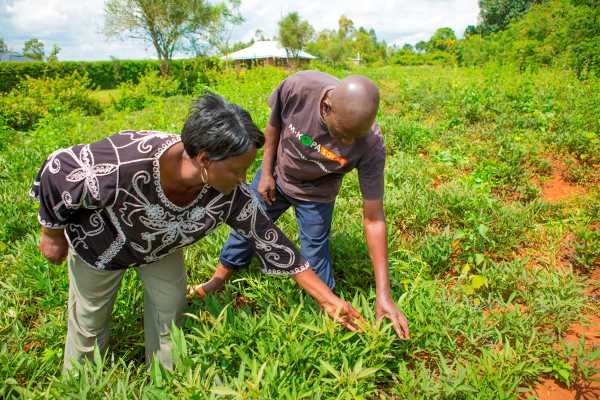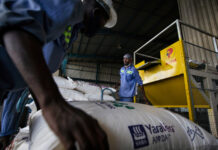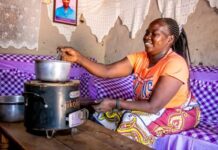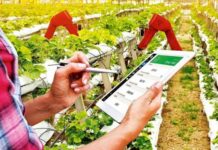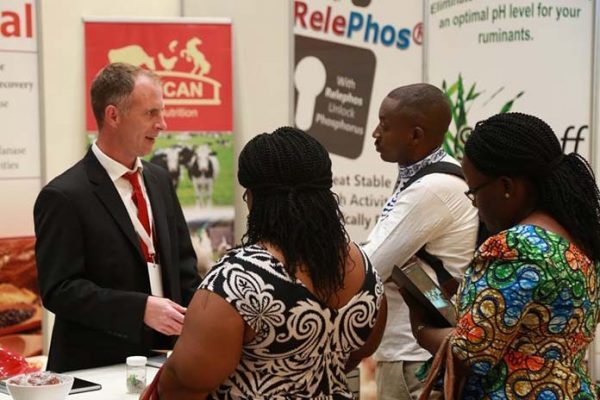2009 AWARD Fellow, Mary Oyunga, on a farm visit
Smallholder farmers across Africa are looking to science to boost farm productivity and tackle emerging threats, chief among them climate change and pandemics as demonstrated by COVID-19.
To create and implement effective solutions to these critical issues and contribute to broader development goals, a recently unveiled report highlights the importance of investment in gender and diversity in agricultural research.
The report, Agspirations: Inspiring stories of African agriculture, volume 1, is published by African Women in Agricultural Research and Development (AWARD). This publication highlights how addressing gender gaps in agricultural research and science, technology, engineering and mathematics (STEM), and overcoming inequalities in access to innovations between men and women, benefits small-scale farmers and the attainment of sustainable agriculture.
Less than a quarter of agricultural researchers in sub-Saharan Africa are women and only 14 per cent of those in leadership positions in agricultural research are women, according to 2017 research commissioned by AWARD. Further, women account for less than 16 percent of the research labor force in agricultural sciences in francophone African countries.
Gender-responsive agriculture research
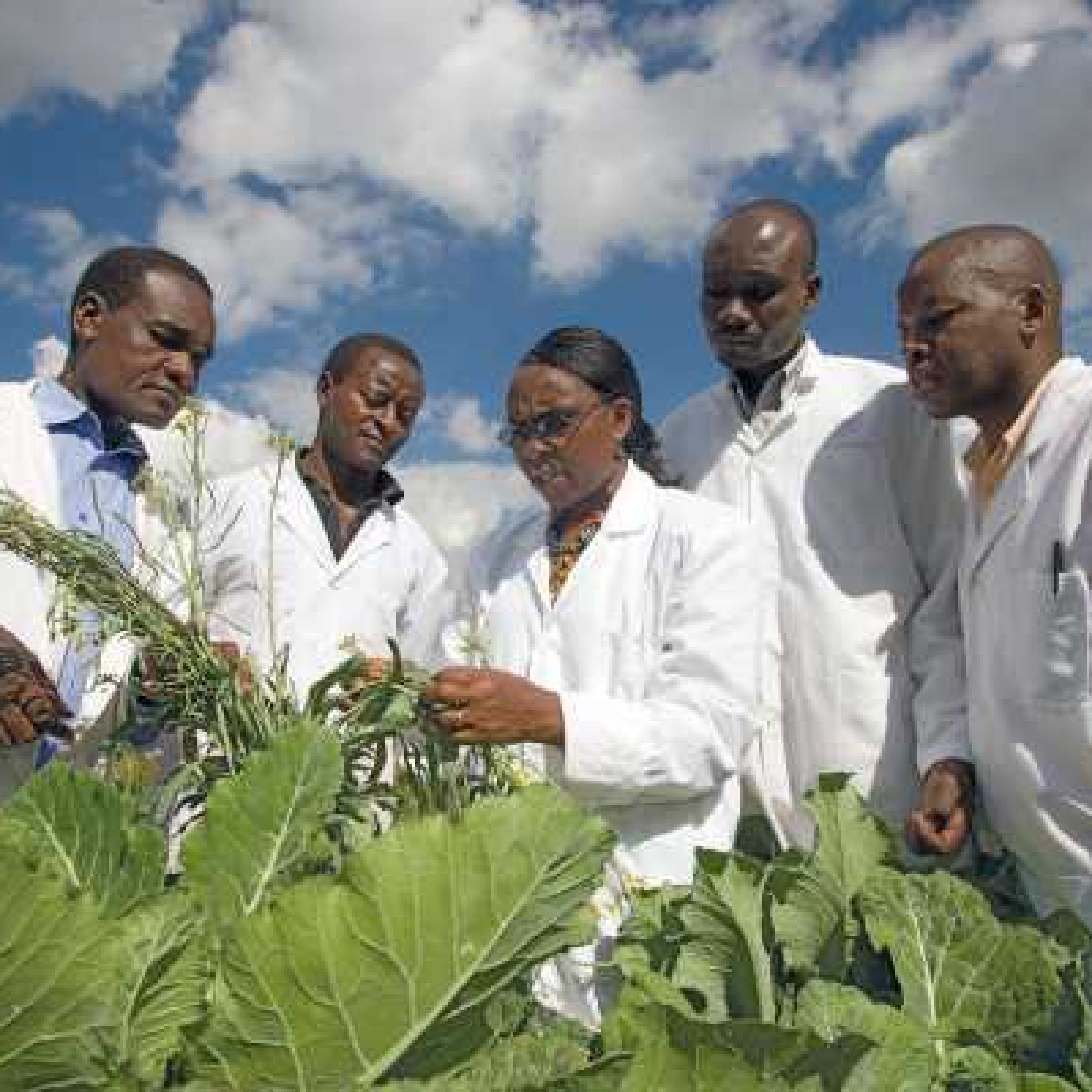
A growing body of research has demonstrated the gains of embracing gender-responsive research and increasing the number of female agricultural scientists in leadership positions. The AgSpirations report states that “The world needs urgent and concerted efforts toward enabling agricultural-dependent communities to thrive in the face of a changing climate. The key to finding solutions is an enhanced focus on the systemic causes of the gender divide in various sectors, including STEM.”
To inspire more women into research, and invest in African women scientists working to improve the livelihoods of rural populations, AWARD has been implementing its flagship AWARD Fellowship for the last 13 years in which women agricultural research scientists undertake a career-development programme that builds their leadership, mentoring, and scientific research skills. To date, the flagship AWARD Fellowship has been offered to 534 of the continent’s top women scientists, referred to as AWARD Fellows, and has benefitted an additional more than 1000 individuals who participated in the program as mentors and Fellows’ mentees. The AWARD Fellows continue to record remarkable growth in their careers, with most taking up senior leadership positions, including as vice-chancellors, center directors and policymakers.
“During my fellowship, I became the head of my research unit, and I am trying to implement what I have learned about on the importance of inclusivity. I am also a member of the gender and diversity team working across four countries through the African Centre of Excellence,” said Éveline Marie Fulbert Windinmi Compaoré a scientific researcher at Institut de l‘Environnement et Recherches Agricoles, Burkina Faso, and a 2018 AWARD Fellow.
The One Planet Fellowship
Cognizant of the need to invest in both male and female researchers to build resilient agricultural systems, AWARD is currently conducting the third year of the One Planet Fellowship. This US$19.2 million initiative, co-managed with the Agropolis Fondation, is building a robust pipeline of scientists working on solutions to help Africa’s smallholder farmers adapt to a changing climate and forging intercontinental collaborations with European scientists for climate change research.
“Through the One Planet Fellowship, we fostered a robust global network of capable and influential researchers and research leaders able to deploy a gender lens to analyze their research’s potential to bridge the gender gap in African agriculture and help smallholders adapt to a changing climate. While this is a harsh reminder of the reality of the imbalance between demand and supply of capacity development on the continent, it is also an opportunity for increased partnerships to build local talent to address climate change in Africa,” noted outgoing AWARD Director Dr. Wanjiru Kamau-Rutenberg.
The 2019 and 2020 cohorts of One Planet Fellowship participants include 89 laureate candidates and 89 mentors, selected from 2,426 applicants across 14 sub-Saharan African countries. The researchers have carried out groundbreaking work ranging from promoting the adoption of climate-smart technologies to improving African seed systems in the context of climate change.
“We in Africa are on the frontline of the changing climate, so creating tailored solutions for smallholder communities is crucial,” said Mevoyon Pamela Karrel Afokpe, Research Station Manager, East-West Seed in Benin, and a 2019 One Planet Laureate Candidate. “The Fellowship also helps me gain confidence in my research as I develop my scientific and leadership skills.”
Strengthening African research institutions
To further bolster capacity to deliver more gender-responsive agricultural research, AWARD has been working with African institutions in various countries. In Ethiopia, where women make up only 10 per cent of all researchers, AWARD has partnered with the Ethiopian Institute of Agricultural Research (EIAR) to prepare women in agricultural research for leadership through a customized fellowship in 2019. This initiative paired senior scientists to serve as mentors to female scientists, , half of which were early-career female recruits. In addition, AWARD designed and delivered a programme on assertiveness and leadership, equipping 30 female academic staff at Mekelle University with practical leadership skills. “The training was a good opportunity to equip women to fill the leadership gap and empower them to take roles at the leadership and management level,” enthused Professor Kindeya Gebrehiwot, former President of the University.
In Nigeria, where AWARD has the largest footprint of over 290 AWARD Fellows, Mentors, and Fellow’s Mentees, the organization partnered with the Federal University of Agriculture Abeokuta (FUNAAB) to conduct a series of capacity-building interventions to improve awareness of gender responsiveness. AWARD further designed and delivered a course for 80 participants from Partnership to Engage, Reform and Learn, a programme designed by the UK’s Foreign, Commonwealth and Development Office to help Nigeria achieve public sector reform.
Meanwhile in Tanzania, AWARD has been running a mentoring model in a number of partner institutions, including the Nelson Mandela African Institute of Science and Technology, where Associate Professor Anna Treydte recognized AWARD’s commitment to building scientists’ capacity, emphasizing the importance of intergenerational networks for knowledge transfer.
Investing in STEM to bridge the gender gap
Continuing its work to bridge the gender gap in STEM research, AWARD has recently developed The Global Forum on Women in Scientific Research (GoFoWiSeR). This initiative highlights the systemic causes of the gender gap in STEM and spotlight the strategies and approaches that improve women’s experiences. In 2019, the initiative mobilized seven international partners to catalyze new connections and strengthen the network of actors and advocates involved in promoting women’s STEM involvement.
The initiative also gathered more than 300 participants from Africa, Europe, and the US in Dakar, Senegal, for a two-day event to discuss potential investments in women’s skills and networks, sustainable career pathways, and the role of institutions and research funders in addressing systemic inequalities. Participants lauded the event, saying it connected them to partnerships and opportunities.
“Gender balance is not only an issue of equity and equality, but also of efficiency. Indeed, integrating gender is key to greater effectiveness. Women all over the world are, whether recognized or not, critical players in decision-making processes,” emphasized Dr. Marie-Christine Cormier-Salem, Director of Agropolis Fondation, a key partner of AWARD.
To interact with the Agspirations report online see: https://bit.ly/3vmMOZp and pdf version: https://bit.ly/3hQpS0X



